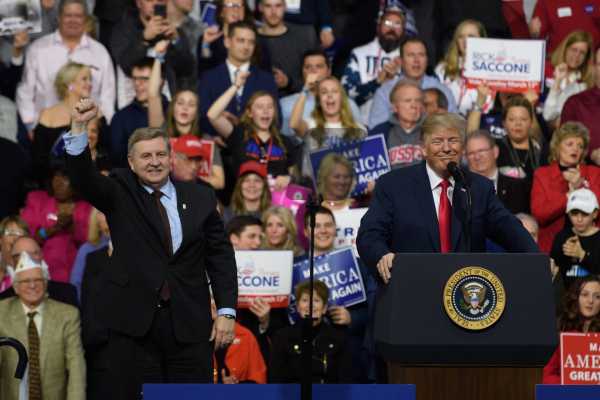
Donald Trump won the 2016 presidential election based on a number of factors — chief among them being his power of personality, particularly among his supporters. And in the White House, Trump’s personal brand has propelled him to an 87 percent approval rating within the GOP, even amid turmoil and chaos taking place both within and without the Oval Office.
The problem for Republicans is that the Trump approach isn’t a replicable model for success. Trump’s scandals are, instead, dragging down the popularity of just about every other figure within the Republican orbit — making it less likely voters would vote for any Republican at all. Republicans in Virginia and Alabama have attempted to take on the Trumpist mantle this year but lost, even in deep-red districts.
That is back in focus once again Wednesday: Republican candidate Rick Saccone, who described himself in November as “Trump before Trump was Trump,” officially lost to Democrat Conor Lamb in a district the previous Republican representative had run unopposed in twice. Trump carried the district by 19 points in 2016.
It’s a general rule of politics that the parties of first-term presidents typically lose seats in Congress during midterms — in 2006, 2010, and 2014, massive “wave” elections have punished the president’s party. And Congress is already deeply unpopular, currently boasting a 15 percent approval rating after attempting (and failing) to repeal Obamacare, coupled with the tax bill’s stagnating popularity.
In Pennsylvania, Saccone was heavily disliked even by his own party (and reportedly also by Trump, who viewed him as “weak”).
Still, if Republicans could harness the kind of enthusiasm the party’s base has for Trump, they’d have a much better 2018 outlook. But time and again, they’ve discovered that it isn’t policy that sells Trump. It’s Trump himself.
“The ‘Lil Trump’ effect doesn’t work,” said Rick Wilson, a Republican political consultant and outspoken critic of Trump, “it’s like pretending to be a ballerina. One either is or isn’t — and you can’t fake it.”
Trump had a platform, but that’s not Trumpism
Trump ran on a platform of isolationism, immigration restrictionism, and nationalism. But even when his acolytes display a similarly brash style and spout the same message, they struggle to find that Trump magic. Even in 2016, Republicans lost seats in Congress while Trump won the White House.
And in 2017 and 2018, the contrast between Trump and Trumpish candidates has been even more stark, first with Roy Moore in Alabama and most recently with Saccone, who declared that supporters of his opponent “have a hatred for God.” Trump even traveled to Pennsylvania, saying at a Saturday rally that voters needed to “Keep America Great” by supporting Saccone. It didn’t work.
Donald Trump Jr. tried to make the case that Saccone is just like his father: “Just because [Donald Trump] is not on the ticket does not mean that everything he stands for and represents for the future isn’t on the ticket,” Trump Jr. said at a campaign rally for Saccone on Monday. He added that the “other side has a hatred for our president.”
But while Trump Jr. tried to make the case for Saccone, he stumbled upon Saccone’s biggest weakness: While he may be like Donald Trump, he simply isn’t Donald Trump. And without Trump’s name on the ballot, a Republican just lost a solidly Republican House seat that his predecessor held since 2002 and last won in 2016 while running unopposed.
That’s because “Trumpism” is just Trump — a television reality show host who won over Republican voters through sheer force of personality, who could sell himself as both a defender of evangelical values and a pro-LGBTQ candidate during the 2016 presidential election, and whose popularity is tied exclusively to him — and not to his political party.
As I’ve written before about Trumpism and its singularity:
In short: Trumpism isn’t a platform, it’s a springboard — for Trump and Trump alone.
Michael O’Connell, a longtime Pennsylvania GOP consultant I’ve been chatting with about the party’s state-level outlook since December, told me that taking on a Trumpist worldview had massive challenges for GOP candidates.
He said that in political circles, there’s almost an “illusion that candidates not named Trump suffer no consequences for incoherent policy proposals or wild-eyed statements on the campaign trail and are immune from scandals in their personal and business life.” But of course, that only works for Trump, who isn’t bound by the normal laws of political physics.
Those who try to get away with the seemingly impossible suffer the normal consequences. After all, Saccone ran to replace a pro-life Republican who reportedly asked his mistress to get an abortion, while Trump himself remains largely unimpeded by evidence of his own repeated infidelity.
Trump does galvanize some voters — Democrats
While the Republican base isn’t motivated by Trump-like candidates, Democrats are. Trump’s name is like waving a red flag before an angry Democratic electorate who are motivated to vote against anyone Trump supports.
“In a general election, active support from Trump is very much a two-way street,” O’Connell told me, “helpful with his supporters but simply disqualifying for the much larger group of voters who oppose Trump.” And while Trump won in Pennsylvania in 2016, that’s a deviation from the norm. “In Pennsylvania, only the most naive imagine that Trump’s path to a very narrow win here in 2016 is one other candidates can rely on.”
But what else can Republicans do? The Trumpist line seems to be the only one that might resonate with voters. In Virginia and more recently in Pennsylvania, state-level GOP officials and the National Republican Congressional Committee stopped running on tax cuts — an issue Republicans believed they could bet on to deliver them wins in the midterm elections later this year — and started back on hammering on cultural issues.
Outsiders don’t have coattails
Barack Obama won two consecutive terms in the White House while his party suffered historic defeats in Congress and in statehouses and governors’ mansions across the country. In an interview with NBC in January 2017, Obama told Lester Holt that he recognized his own support had little impact on state-level or federal election results.
“I had trouble transferring my personal popularity or support to the broader cause of the Democratic Party,” Obama said. And members of his team agreed.
I spoke with Dan Pfeiffer, a former senior adviser to Obama and now co-host of the podcast Pod Save America, and he told me that what made Obama such a towering figure — his unique background and political sensibilities, for example — also made it hard for Democrats to get past him, in a sense.
“Political support, particularly for an outsider, is not easily or automatically transferable because what was appealing about the outsider is often diametrically opposed to what the more establishment figures represent,” Pfeiffer said.
While Obama himself represented something new and fresh — “change,” in other words — Democrats, even those who tried to work within the Obama political mold, didn’t. And the intense dislike for Obama on the right made candidates who appeared to be running in his political footsteps easy targets.
What works, Pfeiffer told me, is to build a movement, not a party based on one singular personality. But, he added, “as the results in 2010 and 2014 show, it’s really hard to do, and we didn’t accomplish it.”
Trump’s clothes, new models
But while Trumpism clearly only works for Trump — just as only Obama could be Obama — that hasn’t stopped state-level Republicans from giving it their best shot.
In Arizona, Kelli Ward is running as President Trump’s greatest ally in the Grand Canyon state. And one of her former staffers, Jennifer Lawrence (who left her campaign, ironically, because Ward wasn’t Trumpist enough) has joined the campaign of the Roy Moore-backed Missouri Senate candidate Courtland Sykes, whose campaign ad pitch to Missouri voters is: “My name is Courtland Sykes, United States Senate candidate for Missouri. And if you like President Trump, then you and I see eye to eye.”
It’s worth noting, however, that it’s unlikely Sykes will win. In the Republican primary, he’s running against Missouri Attorney General Josh Hawley, who has been endorsed by Trump.
Even if Sykes somehow got to the general election, the Trumpism that got him there would eventually sink him, as it did for Roy Moore, Ed Gillespie, and Saccone. And Saccone’s loss in Pennsylvania is all the more evidence that Trumpism as a Republican electoral strategy has been tried over and over again — and found wanting.
As Rick Wilson told me, “If you can’t win on full-Trump in a R+11/T+20, middle-education, middle-income, all-white district, where can it work? It didn’t work in Alabama. It didn’t work in Virginia. It isn’t working for the GOP because the Trump message of racial hostility, anti-immigrant fervor, and lunatic posturing isn’t resonant, even with a strong economy.”
But that won’t stop Republicans from trying. Because, honestly, Trump seems to be the best message they’ve got.
Sourse: vox.com






